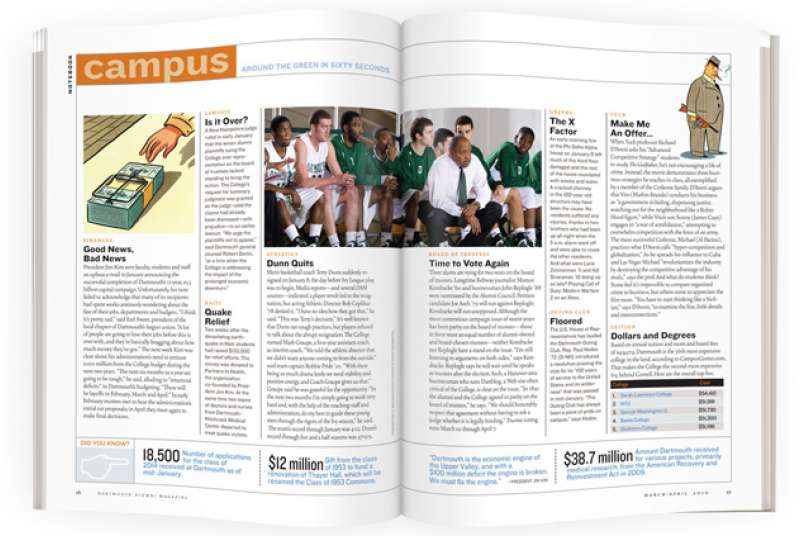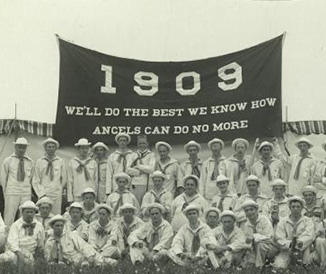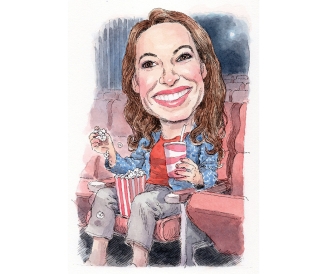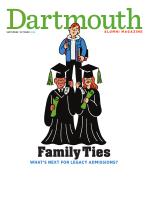
Campus
Good News, Bad News
President Jim Kim sent faculty, students and staff an upbeat e-mail in January announcing the successful completion of Dartmouth’s 11-year, $1.3 billion capital campaign. Unfortunately, his note failed to acknowledge that many of its recipients had spent weeks anxiously wondering about the fate of their jobs, departments and budgets. “I think it’s pretty sad,” said Earl Sweet, president of the local chapter of Dartmouth’s largest union. “A lot of people are going to lose their jobs before this is over with, and they’re basically bragging about how much money they’ve got.” The next week Kim was clear about his administration’s need to jettison $100 million from the College budget during the next two years. “The next six months to a year are going to be tough,” he said, alluding to “structural deficits” in Dartmouth’s budgeting. “There will be layoffs in February, March and April.” In early February trustees met to hear the administration’s initial cut proposals; in April they meet again to make final decisions. UPDATE.
Is the Lawsuit Over?
A New Hampshire judge ruled in early January that the seven alumni plaintiffs suing the College over representation on the board of trustees lacked standing to bring the action. The College’s request for summary judgment was granted as the judge ruled the claims had already been dismissed—with prejudice—in an earlier lawsuit. “We urge the plaintiffs not to appeal,” said Dartmouth general counsel Robert Donin, “at a time when the College is addressing the impact of the prolonged economic downturn.”
Quake Relief
Two weeks after the devastating earthquake in Haiti students had raised $133,000 for relief efforts. The money was donated to Partners In Health, the organization co-founded by President Jim Kim. At the same time two teams of doctors and nurses from Dartmouth-Hitchcock Medical Center departed to treat quake victims.
Dunn Quits
Men’s basketball coach Terry Dunn suddenly resigned on January 8, the day before Ivy League play was to begin. Media reports—and several DAM sources—indicated a player revolt led to the resignation, but acting Athletic Director Bob Ceplikas ’78 denied it. “I have no idea how they got that,” he said. “This was Terry’s decision.” It’s well known that Dunn ran tough practices, but players refused to talk about the abrupt resignation. The College named Mark Graupe, a first-year assistant coach, as interim coach. “We told the athletic director that we didn’t want anyone coming in from the outside,” said team captain Robbie Pride ’10. “With there being so much drama lately we need stability and positive energy, and Coach Graupe gives us that.” Graupe said he was grateful for the opportunity. “In the next two months I’m simply going to work very hard and, with the help of the coaching staff and administration, do my best to guide these young men through the rigors of the Ivy season,” he said. The team’s record through January was 4-12. Dunn’s record through five and a half seasons was 47-103.
Time to Vote Again
Three alums are vying for two seats on the board of trustees. Longtime Beltway journalist Morton Kondracke ’60 and businessman John Replogle ’88 were nominated by the Alumni Council. Petition candidate Joe Asch ’79 will run against Replogle; Kondracke will run unopposed. Although the most contentious campaign issue of recent years has been parity on the board of trustees—those in favor want an equal number of alumni-elected and board-chosen trustees—neither Kondracke nor Replogle have a stand on the issue. “I’m still listening to arguments on both sides,” says Kondracke. Replogle says he will wait until he speaks to trustees after the election. Asch, a Hanover-area businessman who runs Dartblog, a Web site often critical of the College, is clear on the issue. “In 1891 the alumni and the College agreed to parity on the board of trustees,” he says. “We should honorably respect that agreement without having to ask a judge whether it is legally binding.” Trustee voting runs March 10 through April 7.
The X Factor
An early-morning fire at the Phi Delta Alpha house on January 9 left much of the third floor damaged and the rest of the house inundated with smoke and water. A cracked chimney in the 100-year-old structure may have been the cause. No residents suffered any injuries, thanks to two brothers who had been up all night when the 5 a.m. alarm went off and were able to rouse the other residents. And what were Lane Zimmerman ’11 and Adi Sivaraman ’10 doing up so late? Playing Call of Duty: Modern Warfare 2 on an Xbox.
Floored
The U.S. House of Representatives has lauded the Dartmouth Outing Club. Rep. Paul Hodes ’72 (D-NH) introduced a resolution praising the club for its “100 years of service to the United States and its wilderness” that was passed in mid-January. “The Outing Club has always been a point of pride on campus,” says Hodes.
Make Me An Offer…
When Tuck professor Richard D’Aveni asks his “Advanced Competitive Strategy” students to study The Godfather, he’s not encouraging a life of crime. Instead, the movie demonstrates three business strategies he teaches in class, all exemplified by a member of the Corleone family. D’Aveni argues that Vito (Marlon Brando) conducts his business as “a government in hiding, dispensing justice, watching out for the neighborhood like a Robin Hood figure,” while Vito’s son Sonny (James Caan) engages in “a war of annihilation,” attempting to overwhelm competition with the force of an army. The most successful Corleone, Michael (Al Pacino), practices what D’Aveni calls “hyper-competition and globalization.” As he spreads his influence to Cuba and Las Vegas Michael “revolutionizes the industry by destroying the competitive advantage of his rivals,” says the prof. And what do students think? Some feel it’s impossible to compare organized crime to business, but others come to appreciate the film more. “You have to start thinking like a Sicilian,” says D’Aveni, “to examine the fine, little details and interconnections.”
Dollars and Degrees
Based on annual tuition and room and board fees of $49,974, Dartmouth is the 36th most expensive college in the land, according to CampusGrotto.com. That makes the College the second-most expensive Ivy, behind Cornell. Here are the overall top five: Sarah Lawrence College ($54,410), NYU ($51,991), George Washington University ($51,730), Bates College ($51,300) and Skidmore College ($51,196).










